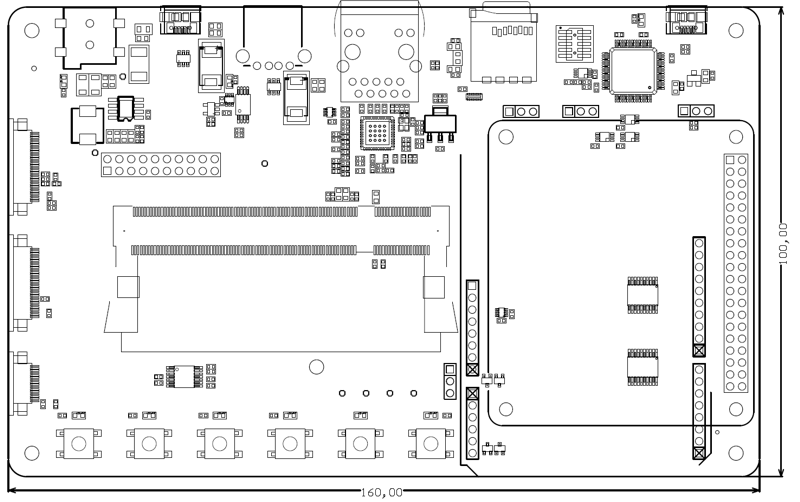StarCB-6ULL-STD Datasheet and Pinout: Difference between revisions
From SomLabs Wiki
| Line 152: | Line 152: | ||
| 2 || VDD-5V0 || Power supply for external loads (up to 200 mA) | | 2 || VDD-5V0 || Power supply for external loads (up to 200 mA) | ||
|- | |- | ||
| 3 || I2C2-SDA || - | | 3 || I2C2-SDA || 4,7k pull-up resistor connected<br>Connected to LCD J300 connector (touch panel controller) | ||
|- | |- | ||
| 4 || VDD-5V0 || Power supply for external loads (up to 200 mA) | | 4 || VDD-5V0 || Power supply for external loads (up to 200 mA) | ||
|- | |- | ||
| 5 || I2C2-SCL || - | | 5 || I2C2-SCL || 4,7k pull-up resistor connected<br>Connected to LCD J300 connector (touch panel controller) | ||
|- | |- | ||
| 6 || GND || - | | 6 || GND || - | ||
Revision as of 12:59, 22 December 2022

StarCB-6ULL-STD Datasheet and Pinout
General description
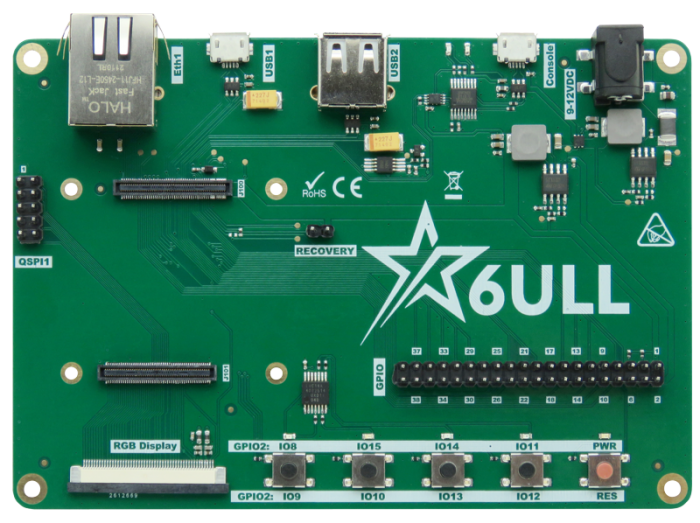
StarCB-6ULL-STD is a carrier board for the StarSOM-6ULL family of computer-on-modules, which are powered by NXP i.MX 6ULL application processors (ARM Cortex-A7). A carrier board, together with a System on Module (SoM), makes a complete development platform similar to SBC. The carrier board houses the most common interfaces such as USB, Ethernet, etc. A large variety of interfaces allows to use it as both a complete development platform or as a stand-alone end-product.
The carrier board connects with the SoM via a board-to-board, low profile connectors.
Applications
- IoT Sensor Hubs
- Home Appliances
- IoT gateways
- Protocol converters
- Home Automation – Smart Home
- Point-of-sales (POS) terminals
- Cash Register
- 2D barcode scanners and printers
- Smart grid infrastructure
- Residential gateways
- Outdoor equipment
Features
- Carrier Board (Base Board) compatible with the StarSOM-6ULL family of modules based iMX6ULL application processors
- SoM Interface: 2x100 board-to-board connectors
- Debug Interface: Linux console (vCOM/USB)
- Expansion Connectors:
- QSPI connector 2x10 Pin Header (Male)
- GPIO connector 2x20 Pin Header (Male)
- Communication Connectors:
- 1x Ethernet 10/100Mbit/s, RJ45
- 1x USB Host Type A connectors
- 1x USB OTG Micro AB connector
- 1x Console MicroUSB B connector
- Display Interface:
- 50-pin FFC/FPC parallel RGB (up to 24 bits)
- User Interface:
- 4+1 Pushbuttons
- 4+3 LEDs
- External Power Supply 9-12V DC
- Temperature Range: 0 to +70°C
- Board Size: 130mm x 90mm x 20mm
Pictures of StarCB-6LLL-STD board
| Version | Photo |
|---|---|
| StarCB-6LL-STD board only |
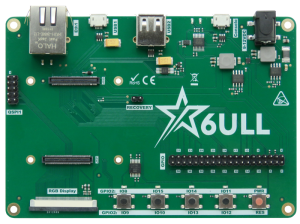 |
| StarCB-6LL-STD board - bottom side |
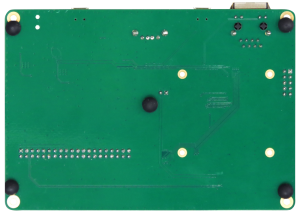 |
| StarCB-6LL-STD board with StarSOM-6ULL installed |
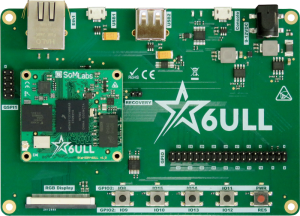 |
Ordering info
Block Diagram
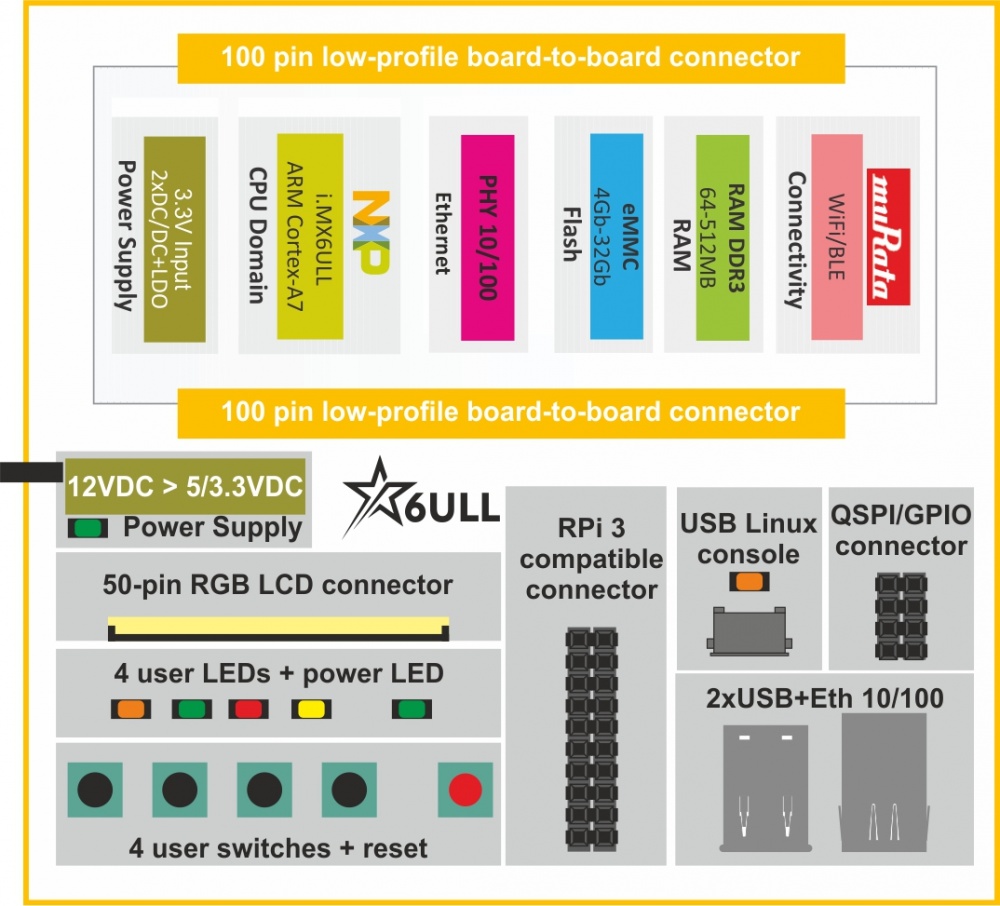
Electrical parameters
| Parameter | Value | Units | Comment | ||
|---|---|---|---|---|---|
| Min. | Typ. | Max. | |||
| Power Supply | 9.0 | 12.0 | 15.0 | V | Positive pole on central connector of J400 |
| Supply current | - | - | 0.09 | A | Excluding SOM, LCD, USB and antoher external loads |
| GPIO voltage | 3.3/5 | V | |||
QSPI interface (J502, 2x5 gold-pin, 2.54mm)
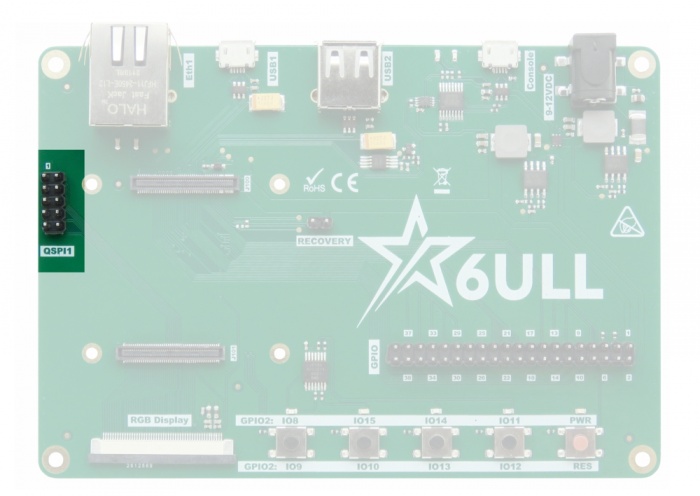
| Pin | Signal | Description |
|---|---|---|
| 1 | QSPI1.D0 | optionally GPIO4.12 |
| 2 | VDD-EMMC | Internal (on SOM) 1.8V LDO output as reference or power supply voltage for QSPI (SDIO) interface |
| 3 | QSPI1.D1 | optionally GPIO4.13 |
| 4 | QSPI1.CS0 | optionally GPIO4.16 |
| 5 | QSPI1.D2 | optionally GPIO4.14 |
| 6 | QSPI1.CLK | optionally GPIO4.11 |
| 7 | QSPI1.D3 | optionally GPIO4.15 |
| 8 | - | - |
| 9 | QSPI1.DQS | optionally GPIO4.10 |
| 10 | GND | - |
GPIO connector (J500, 2x20 gold-pin, 2.54mm)
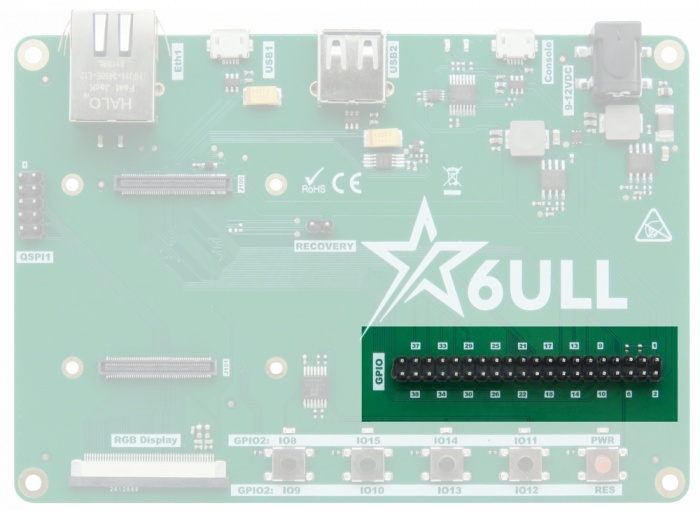
| Pin | Signal | Description |
|---|---|---|
| 1 | VDD-3V3 | Power supply for external loads (up to 300 mA) |
| 2 | VDD-5V0 | Power supply for external loads (up to 200 mA) |
| 3 | I2C2-SDA | 4,7k pull-up resistor connected Connected to LCD J300 connector (touch panel controller) |
| 4 | VDD-5V0 | Power supply for external loads (up to 200 mA) |
| 5 | I2C2-SCL | 4,7k pull-up resistor connected Connected to LCD J300 connector (touch panel controller) |
| 6 | GND | - |
| 7 | TAMPER.0 | - |
| 8 | UART3.TXD | - |
| 9 | GND | - |
| 10 | UART3.RXD | - |
| 11 | TAMPER.1 | - |
| 12 | UART3.RTS | - |
| 13 | TAMPER.2 | |
| 14 | GND | - |
| 15 | TAMPER.3 | - |
| 16 | UART3.CTS | - |
| 17 | VDD-3V3 | - |
| 18 | JTAG.TDI | |
| 19 | UART1.CTS | - |
| 20 | GND | - |
| 21 | UART1.RTS | - |
| 22 | JTAG.TMS | - |
| 23 | UART1.RXD | - |
| 24 | UART1.TXD | - |
| 25 | GND | - |
| 26 | TAMPER.9 | - |
| 27 | - | - |
| 28 | - | - |
| 29 | TAMPER.4 | - |
| 30 | GND | - |
| 31 | UART2.RXD | - |
| 32 | TAMPER.8 | - |
| 33 | UART2.TXD | - |
| 34 | GND | - |
| 35 | UART2.CTS | - |
| 36 | TAMPER.7 | - |
| 37 | UART2.CTS | - |
| 38 | TAMPER.6 | - |
| 39 | GND | - |
| 40 | TAMPER.5 | - |
Note:
1. 1st pin of J302 connector is at the top of the image.
Display MIPI-DSI interface (J301, FPC/FFC 0.5mm)
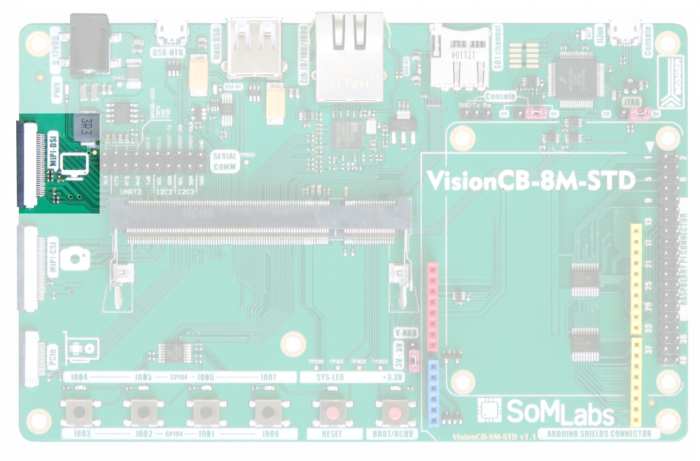
| Pin | Signal | Description |
|---|---|---|
| 1 | GND | - |
| 2 | DSI-CLK-P | - |
| 3 | DSI-CLK-P | - |
| 4 | GND | - |
| 5 | DSI-DATA0-P | - |
| 6 | DSI-DATA0-N | - |
| 7 | GND | - |
| 8 | DSI-DATA1-P | - |
| 9 | DSI-DATA1-N | - |
| 10 | GND | - |
| 11 | DSI-DATA2-P | - |
| 12 | DSI-DATA2-N | - |
| 13 | GND | |
| 14 | DSI-DATA3-P | - |
| 15 | DSI-DATA3-N | - |
| 16 | GND | - |
| 17 | I2C2-SCL | Display confguration I2C interface (3.3V) |
| 18 | I2C2-SDA | Display confguration I2C interface (3.3V) |
| 19 | GND | - |
| 20 | SAI3-RXFS | Optional display reset signal |
| 21 | GPIO5-IO23 | Optional touch-panel interrupt signal (with 47k pull-up) |
| 22 | SPDIF-TX | Optional touch-panel controller reset |
| 23 | GND | - |
| 24 | +3.3V | Power supply for external devices |
| 25 | +3.3V | Power supply for external devices |
| 26 | +5V | Power supply for external devices |
| 27 | +5V | Power supply for external devices |
| 28 | SPDIF-RX | Optional backlight intensity PWM controller |
| 29 | SPDIF-CLK | Optional backlight enable |
| 30 | GND | - |
Note:
1. 1st pin of J301 connector is at the top of the image.
USB Console Port and Segger J-Link debugger
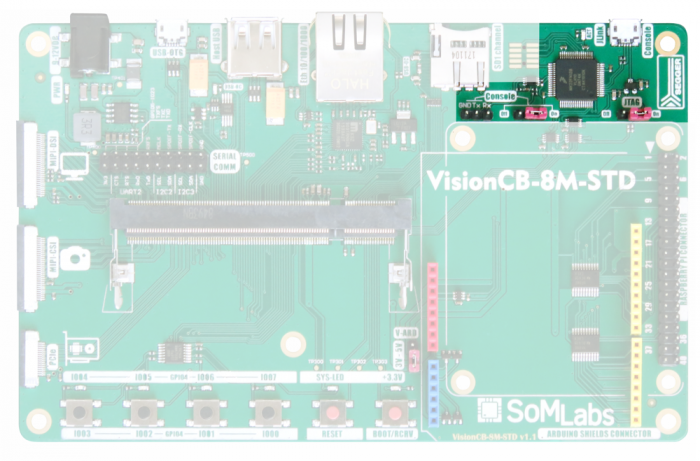
| MPU Port | GPIO | Description |
|---|---|---|
| CONSOLE-TXD | UART4-TXD | Signal connected to J304 pin 2 |
| CONSOLE-RXD | UART4-RXD | Signal connected to J304 pin 3 |
Notes:
1. Linux console port (UART4 in MPU) uses vCOM interface provided by built-in debugger Segger J-Link.
2. vCOM can be disconnected from MPU with JP801 (jumper CONSOLE in position ON or OFF).
3. Lines TXD and RXD of UART4 are easy to monitoring thanks to using J304 gold-pins.
4. Debug JTAG interface can be disconnected from MPU with JP800 (jumper JTAG in position ON or OFF).
MicroSD card interface (J308)
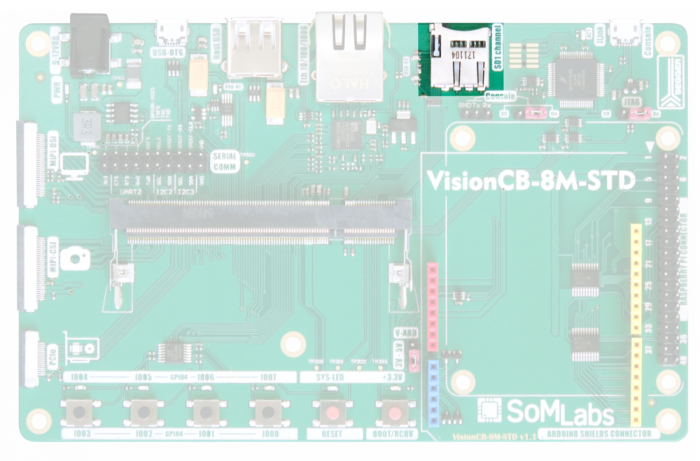
| Connector pin | SD card signal | SOM pin |
|---|---|---|
| 1 | DATA2 | SD1-DATA2 |
| 2 | DATA3 | SD1-DATA3 |
| 3 | CMD | SD1-CMD |
| 4 | NVCC-SDIO | Voltage selected 1.8/3.3V by SD1 driver |
| 5 | CLK | SD1-CLK |
| 6 | GND | - |
| 7 | DATA0 | SD1-DATA0 |
| 8 | DATA1 | SD1-DATA1 |
| 9 | CARD-DETECT | SD1-CD |
Raspberry Pi compatible I/O header
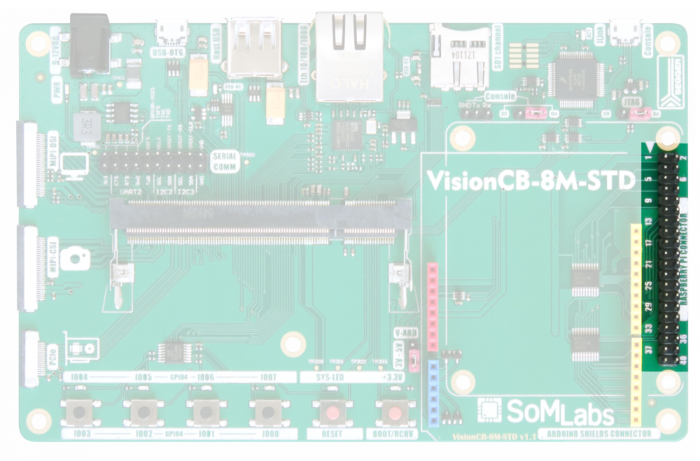
| Pin | Default function name | Description |
|---|---|---|
| 1 | +3.3V | +3.3V generated by DC/DC built-in SOM (limited current load) |
| 2 | +5V | +5V generated by carrier board built-in DC/DC converter |
| 3 | I2C1-SDA | I2C1-SDA line |
| 4 | +5V | +5V generated by carrier board built-in DC/DC converter |
| 5 | I2C1-SDA | I2C1-SDA line |
| 6 | GND | - |
| 7 | GPIO4-IO09 | Universal GPIO with 3.3V logic levels |
| 8 | UART3-TXD | Default: UART3 TXD line or universal GPIO with 3.3V logic levels |
| 9 | GND | - |
| 10 | UART3-RXD | Default: UART3 RXD line or universal GPIO with 3.3V logic levels |
| 11 | GPIO4-IO08 | Universal GPIO with 3.3V logic levels |
| 12 | SPI2-CLK | Default: SPI2-CLK line or universal GPIO with 3.3V logic levels |
| 13 | - | - |
| 14 | GND | - |
| 15 | - | - |
| 16 | SPI2-MISO | Default: SPI2-MISO line or universal GPIO with 3.3V logic levels |
| 17 | +3.3V | +3.3V generated by DC/DC built-in SOM (limited current load) |
| 18 | SPI2-MOSI | Default: SPI2-MOSI line or universal GPIO with 3.3V logic levels |
| 19 | SPI1-MOSI | Default: SPI1-MOSI line or universal GPIO with 3.3V logic levels |
| 20 | GND | - |
| 21 | SPI1-MISO | Default: SPI1-MISO line or universal GPIO with 3.3V logic levels |
| 22 | SPI2-SS0 | Default: SPI2-SS0 line or universal GPIO with 3.3V logic levels |
| 23 | SPI1-CLK | Default: SPI1-CLK line or universal GPIO with 3.3V logic levels |
| 24 | SPI1-SS0 | Default: SPI1-SS0 line or universal GPIO with 3.3V logic levels |
| 25 | GND | - |
| 26 | GPIO-IO22 | Universal GPIO with 3.3V logic levels |
| 27 | - | - |
| 28 | - | - |
| 29 | GPIO4-IO12 | Universal GPIO with 3.3V logic levels |
| 30 | GND | - |
| 31 | GPIO4-IO13 | Universal GPIO with 3.3V logic levels |
| 32 | GPIO4-IO20 | Universal GPIO with 3.3V logic levels |
| 33 | GPIO4-IO14 | Universal GPIO with 3.3V logic levels |
| 34 | GND | - |
| 35 | GPIO4-IO14 | Universal GPIO with 3.3V logic levels |
| 36 | GPIO4-IO19 | Universal GPIO with 3.3V logic levels |
| 37 | GPIO4-IO16 | Universal GPIO with 3.3V logic levels |
| 38 | GPIO4-IO18 | Universal GPIO with 3.3V logic levels |
| 39 | GND | - |
| 40 | GPIO4-IO17 | Universal GPIO with 3.3V logic levels |
Arduino Uno compatible I/O header
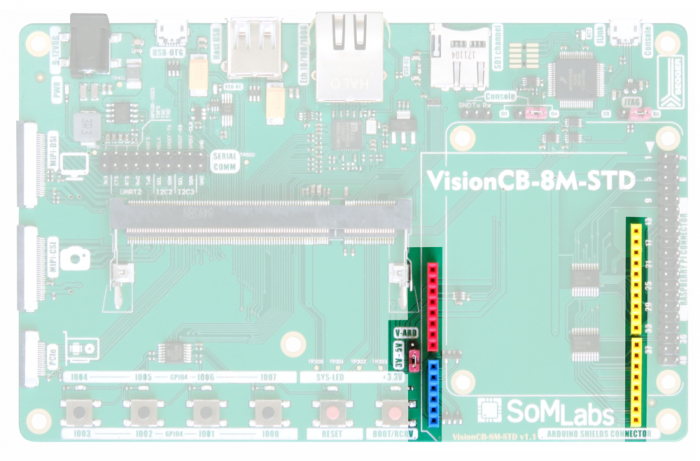
| Pin | Arduino name | Default function name | Description |
|---|---|---|---|
| Power connector J700, red connector | |||
| 1 | - | - | - |
| 2 | IOREF | VDD-ARDUINO-IO | Selected +3.3V or +5V (with V-ARD jumper). |
| 3 | RESET | POR-B | External reset input, active L. |
| 4 | 3.3V | VCC-3V3 | +3.3V generated by internal SOM LDO converter (limited load current). |
| 5 | 5V | VCC-5V0 | +5V generated by carrier board built-in DC/DC converter. |
| 6 | GND | GND | - |
| 7 | GND | GND | - |
| 8 | VIN | VCC-3V3 | +3.3V generated by internal SOM LDO converter (limited load current). |
| Analog inputs connector J702, blue connector | |||
| 1 | AIN0 | - | Not internally connected. |
| 2 | AIN1 | - | Not internally connected. |
| 3 | AIN2 | - | Not internally connected. |
| 4 | AIN3 | - | Not internally connected. |
| 5 | - | - | Not internally connected. |
| 6 | - | - | Not internally connected. |
| Digital I/Os connector J704, yellow connector | |||
| 1 | DIO0 | UART3-RXD | Default: UART3-RXD line or universal GPIO with 3.3/5V logic levels. |
| 2 | DIO1 | UART3-TXD | Default: UART3-TXD line or universal GPIO with 3.3/5V logic levels. |
| 3 | DIO2 | GPIO4-IO15 | Universal GPIO with 3.3/5V logic levels. |
| 4 | DIO3 | GPIO4-IO14 | Universal GPIO with 3.3/5V logic levels. |
| 5 | DIO4 | GPIO4-IO13 | Universal GPIO with 3.3/5V logic levels. |
| 6 | DIO5 | GPIO4-IO12 | Universal GPIO with 3.3/5V logic levels. |
| 7 | DIO6 | GPIO4-IO11 | Universal GPIO with 3.3/5V logic levels. |
| 8 | DIO7 | GPIO4-IO10 | Universal GPIO with 3.3/5V logic levels. |
| Digital I/Os connector J703, yellow connector | |||
| 1 | DIO8 | GPIO4-IO08 | Universal GPIO with 3.3/5V logic levels. |
| 2 | DIO9 | GPIO4-IO09 | Universal GPIO with 3.3/5V logic levels. |
| 3 | DIO10 | SPI1-SS0 | Default: SPI1-SS0 line or universal GPIO with 3.3/5V logic levels. |
| 4 | DIO11 | SPI1-MOSI | Default: SPI1-MOSI line or universal GPIO with 3.3/5V logic levels. |
| 5 | DIO12 | SPI1-MISO | Default: SPI1-MISO line or universal GPIO with 3.3/5V logic levels. |
| 6 | DIO13 | SPI1-CLK | Default: SPI1-CLK line or universal GPIO with 3.3/5V logic levels. |
| 7 | GND | GND | - |
| 8 | AREF | VDD-ARDUINO-IO | +3.3V or +5V selected with V-ARD jumper. |
| 9 | DIO14 | I2C1-SCL | Default: I2C1-SCL line or universal GPIO with 3.3/5V logic levels. |
| 10 | DIO15 | I2C1-SDA | Default: I2C1-SDA line or universal GPIO with 3.3/5V logic levels. |
Notes:
1. I/O logic levels are selected 3.3/5V with V-ARD jumper.
2. RESET line is 3.3 and 5V compatible.
Serial Communication/GPIO header (J305)
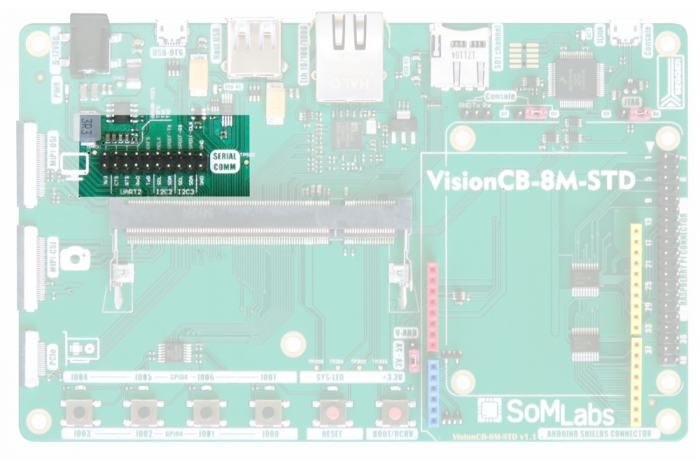
| Pin | Default function name | Description |
|---|---|---|
| 1 | +3.3V | +3.3V generated by DC/DC built-in SOM (limited current load) |
| 2 | GPIO5-IO23 | Universal GPIO with 3.3V logic levels By default is connected to MIPI-DSI (J301) as touch-panel interrupt line (with 47k pull-up) |
| 3 | UART2-CTS | By default: UART2-CTS or universal GPIO with 3.3V logic levels |
| 4 | SAI3-TXFS | By default: SAI3-TXFS or universal GPIO with 3.3V logic levels Connected to MIPI-CSI (J302) |
| 5 | UART2-RTS | By default: UART2-RTS or universal GPIO with 3.3V logic levels |
| 6 | SAI3-TXC | By default: SAI3-TXC or universal GPIO with 3.3V logic levels Connected to MIPI-CSI (J302) |
| 7 | UART2-RXD | By default: UART2-RXD or universal GPIO with 3.3V logic levels |
| 8 | SAI3-TXD | By default: SAI3-TXD or universal GPIO with 3.3V logic levels |
| 9 | UART2-TXD | By default: UART2-TXD or universal GPIO with 3.3V logic levels |
| 10 | SAI3-RXFS | By default: SAI3-RXFS or universal GPIO with 3.3V logic levels By default is connected to MIPI-DSI (J301) as display module reset signal |
| 11 | I2C2-SCL | By default: I2C2-SCL or universal GPIO with 3.3V logic levels Default I2C port for PCIe (J303), MIPI-DSI (J301) and MIPI-CSI (J302) |
| 12 | SAI3-MCLK | By default: SAI3-MCLK or universal GPIO with 3.3V logic levels |
| 13 | I2C2-SDA | By default: I2C2-SDA or universal GPIO with 3.3V logic levels Default I2C port for PCIe (J303), MIPI-DSI (J301) and MIPI-CSI (J302) |
| 14 | SPDIF-TX | By default: SPDIC-TX or universal GPIO with 3.3V logic levels By default is connected to MIPI-DSI (J301) as touch-panel reset signal |
| 15 | I2C3-SCL | By default: I2C3-SCL or universal GPIO with 3.3V logic levels |
| 16 | SPDIF-RX | By default: I2C3-SCL or universal GPIO with 3.3V logic levels By default is connected to MIPI-DSI (J301) as display module PWM backlight control |
| 17 | I2C3-SDA | By default: I2C3-SDA or universal GPIO with 3.3V logic levels |
| 18 | SPDIF-CLK | By default: SPDIF-CLK or universal GPIO with 3.3V logic levels By default is connected to MIPI-DSI (J301) as display module on/off signal |
| 19 | GND | - |
| 20 | GND | - |
User Interface (switches and LEDs)
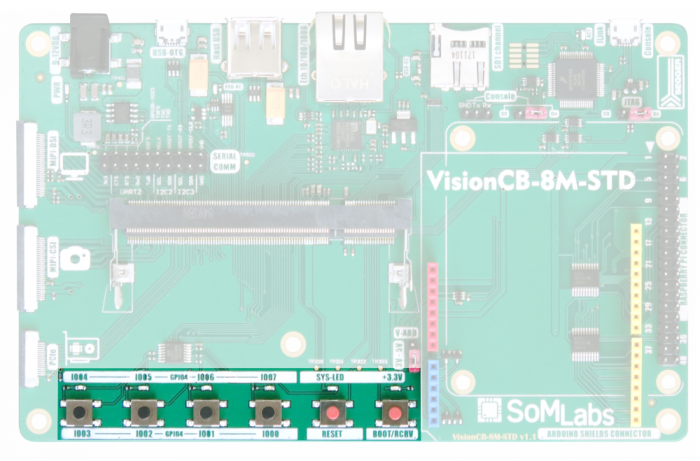
User switches
| Switch | GPIO | Description |
|---|---|---|
| S305 (black, most on the left) | GPIO4-IO03 | 47k pull-up |
| S304 | GPIO4-IO02 | 47k pull-up |
| S303 | GPIO4-IO01 | 47k pull-up |
| S302 (black, most on the right) | GPIO4-IO00 | 47k pull-up |
System switches
| Switch | Signal name | Description |
|---|---|---|
| S301 (left, red) | Reset | - |
| S300 (right, red) | BOOT-RECOVERY | - |
User LEDs
| LED | GPIO | Description |
|---|---|---|
| D303 (most on the left) | GPIO4-IO04 | User LED1, buffered with inverter |
| D302 | GPIO4-IO05 | User LED2, buffered with inverter |
| D301 | GPIO4-IO06 | User LED3, buffered with inverter |
| D300 (most on the right) | GPIO4-IO07 | User LED4, buffered with inverter |
System LEDs
| LED | GPIO | Description |
|---|---|---|
| D304 | SYS-LED | System function monitoring |
| D305 | - | Power LED (3.3V) |
Dimensions
